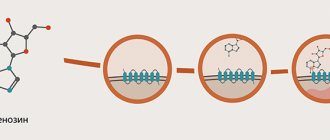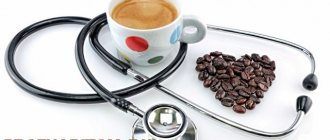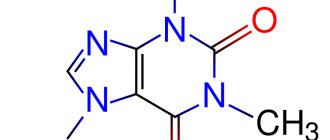Coffee overdose
The symptom of overdose is familiar to many coffee lovers. Breathing becomes shallow, the heart beats quickly, and seems to “gurgle” or “bubble” in the chest. The skin turns pale, hands and feet are cold and trembling. The person feels hot and cold, and may break out in a cold sweat. My head is spinning and I'm starting to get motion sick.
This is due to the fact that the vessels narrow sharply, and oxygen and blood do not reach the brain and capillaries in sufficient quantities. Usually people get scared and, as a last resort, call doctors, but more often than not everything goes away just like that. You need to drink water to reduce the concentration of caffeine so that it is absorbed more slowly. But you usually don’t get the hang of coffee. These are just unpleasant sensations, and the overdose quickly wears off.
The sensations from a coffee overdose usually go away within 15-20 minutes. It is advisable to take a short nap after this, and when you wake up, give up coffee that day.
How does coffee affect the body?
The main active ingredient of the drink is caffeine, which increases the feeling of vigor, enhances the tone of blood vessels and improves gastric secretion. At the same time, an overdose of coffee and caffeine causes a number of unpleasant sensations, including tachycardia (increased heart rate), insomnia, hyperhidrosis (excessive sweating) and anxiety.
There is an opinion that caffeine is a stimulant of the nervous system. But at its core. It is wrong. This alkaloid does not have a direct stimulating effect.
In its chemical structure, it is similar to a substance that is involved in the regulation of sleep and wakefulness called adenosine. By binding to specific receptors on nerve cells located in the brain, adenosine gives a signal that the “guard is tired” and it’s time to sleep. Caffeine itself is able to bind to these receptors, preventing adenosine from reaching them. Thus, it blocks the transmission of the signal of fatigue, and the person remains alert. After a couple of hours, most of the caffeine will be eliminated from the body, adenosine receptors will be freed, and the state of fatigue will return.
In addition, by blocking adenosine receptors, caffeine simultaneously increases the sensitivity of dopamine receptors. And dopamine is one of the main neurotransmitters that causes a feeling of satisfaction and can lift your mood.
Caffeine causes an increase in the levels of the main stress hormones – cortisol and adrenaline. As a result, tachycardia occurs, there is an increase in blood pressure and acceleration of blood flow and, as a result, the supply of oxygen to tissues improves. All this also prevents the body from falling asleep.
Let us also mention the weak diuretic effect of caffeine.
From the above, it becomes clear that exceeding the dose of caffeine is not recommended. And the point here is not only that the described unpleasant symptoms of stress can intensify and even lead to coma. The main danger (even two) is the body’s addiction. On the one hand, this will lead to the need to produce more and more hormones and mediators to achieve the same level of effect as before. And, on the other hand, it will contribute to the depletion of their synthesis.
How much coffee does it take to die?
Scientists conducted studies to calculate the lethal dose of caffeine. For obvious reasons, there were no groups of volunteers, so all calculations are purely theoretical, or based on data on the death of people who consumed too much caffeine (in tablets or powder). The average lethal dose is 10 grams. A cup of black coffee contains approximately 80 mg of caffeine.
In order for the dose to be lethal, you need to get about 80 mg of caffeine per kilogram of weight.
- For a person weighing 60 kg, the dose is approximately 60 cups over 2-4 hours. This is 12 liters.
- For a person weighing 80 kg – 80 cups. This is 16 liters of coffee.
About one cup every two minutes. Strong, black, good coffee. Another thing is that you physically won’t be able to drink that much: after just 3-5 cups in a short period of time you will feel all the symptoms of an overdose. You will immediately want to lie down, you will feel nauseated, and perhaps vomiting will appear, as the body suffers from intoxication and seeks to get rid of the poison.
The strongest coffee in the world is Death Wish Coffee. A 30 ml cup contains about 50 mg of caffeine.
A few facts that it is almost impossible to die from coffee:
- The stomach simply physically cannot fit 12-16 liters of coffee in an hour or two.
- Too much fluid will cause you to vomit.
- Intoxication will also cause vomiting.
- Caffeine is sometimes used as an antidote: it has a tanning effect on the walls of the stomach, and they stop absorbing substances. Including, the caffeine itself will be absorbed after some time.
- The diuretic effect will work: the liquid will be rapidly excreted.
- The acids contained in the drink will cause the intestines to become active and cause diarrhea. You won't have time for new servings of coffee in this state.
Women are more sensitive to caffeine than men. Their body quickly recognizes the poison in it and strives to get rid of it.
Caffeine tolerance
Caffeine tolerance is a term often used to describe the effects of caffeine on the body. At its core, it describes how much a certain dose of caffeine affects a particular person.
This term should not be confused with caffeine sensitivity. Resistance occurs over time, while sensitivity is determined by an individual's genetic predisposition to absorb the caffeine molecule .
Consider a person who has never taken caffeine in his life, or who has abstained from caffeine-containing foods and drinks for a long time. It is generally accepted that such a person will have zero tolerance to caffeine. In other words, his body will mistake caffeine for an unfamiliar substance.
It is in such cases that the effect of taking caffeine will be most noticeable. You can note:
- Euphoria
- Increased vigilance
- Positive mood,
- Increased motivation
- Increased energy.
However, if you take the same dose of caffeine the next day, you will notice that the above effects are less pronounced.
If you continue to consume caffeine daily, the expected effect will decrease in a very short time.
Ultimately, the same amount of caffeine will only bring you to a “normal” state.
What this means is that the person will experience noticeable fatigue and a complete lack of energy - much more noticeable than before starting to drink caffeine. And the usual daily dose will only return him to working mode, and will not give him the expected “superpowers”.
Risks to think about
Healthy people are in little danger. But in some cases, an overdose of caffeine can actually be fatal. You need to be careful in the following cases:
- If you have diseases of the cardiovascular system;
- If you drink coffee after alcohol poisoning;
- If you rarely drink coffee, but are now going to drink a cup of strong natural coffee;
- In a state of lack of sleep, stress, acclimatization, jet lag.
Basically, by monitoring your condition, you will feel the symptoms of an overdose. Drink water, try to take a reclining position, induce vomiting. This is unpleasant, but rarely fatal. If you feel that something is wrong, call an ambulance and rinse your stomach.
Reversal of caffeine tolerance
Fortunately for all of us, there are ways to restore caffeine tolerance to its original levels or avoid this unpleasant effect altogether.
- Caffeine "reboot" . This option is intended for those who are already accustomed to daily doses of caffeine. Its essence is to completely abstain from caffeine-containing products for a period of 2 weeks to 2 months (these periods are purely individual and depend on how much caffeine a person usually consumed per day). During this time, the body will adjust to its original mode without caffeine.
- Drink caffeine only occasionally . It sounds logical that the best way to avoid caffeine resistance is to simply prevent it from developing. If you consume caffeine-containing products 1-2 times a week, the desired effects will occur with each dose, and resistance will not arise due to a sufficiently long break between doses. Arguably, occasional caffeine consumption (only when necessary) is the best and safest way to get an energy boost without sacrificing your long-term health.
It is also worth noting that drinking coffee or strong tea late in the evening is not recommended if your caffeine tolerance is zero. There is a very high risk of getting insomnia.
A caffeine reset, or preventing caffeine tolerance, will allow you to experience that wonderful feeling of euphoria with 100-200 mg of caffeine (a dose roughly equal to 1-2 espresso shots). The main thing to remember is to avoid regular (daily) caffeine consumption.
Of course, many people will find it extremely difficult to adhere to such advice. With similar success, you can ask a heavy smoker to smoke only 3 cigarettes at 3-day intervals. Caffeine can be extremely addictive, and some people find it easier to take an all-or-nothing approach: if you drink, then regularly, if you don’t drink, then never at all.
However, if you notice that you have developed a caffeine tolerance, it may be worth considering a reset.
Then everyone can decide for themselves whether caffeine will be their future companion in life. The key question in making this decision is: can you control the number and frequency of doses consumed?
Conclusions:
- People sometimes die from overdosing on caffeine tablets or energy drinks. From coffee - rarely. Maximum – an overdose occurs, and the body gets rid of toxins.
- To die from coffee you need to drink 12-16 liters of black coffee in a couple of hours. And then, in the process there will be an overdose and vomiting.
- If your heart hurts and you have all the symptoms of an overdose, drink a couple of glasses of water, lie down, and provide access to oxygen. You can induce vomiting. After 15-20 minutes, relief will come.
- According to doctors, 2-3 cups of coffee a day will not harm people without serious cardiovascular diseases.
Lethal dose of coffee for a teenager
During adolescence, drinking coffee drinks should be treated with particular caution. In 2011, there was a case where a girl died after drinking a couple of cans of coffee energy drink. A single dose of caffeine was only 480 mg. This amount of natural stimulant is considered safe for an adult.
Combining coffee drinks with energy drinks, or drinking espresso after a party where alcohol was consumed, often leads to teenagers instantly receiving a lethal dose. Young people should drink no more than two cups of coffee per day . And not in a row, but at intervals of at least 3-4 hours. In addition, it is unacceptable to drink caffeinated drinks after alcohol, cigarettes and energy drinks.
Americano and espresso can have a positive effect on the body, but only if they are drunk in moderation. Exceeding the permissible dosage leads to a deterioration of the condition and the manifestation of symptoms of intoxication. In rare cases, due to excessive concentration of a natural stimulant in the body, there is a risk of death.
Regular abuse
Getting used to the taste and effect of a hot aromatic liquid occurs over years of regular use. A person does not notice how he needs an increasing dose of caffeine. It can spontaneously increase during periods of heavy workload at work or school, when it is necessary to quickly concentrate and continue activities.
More than 4-5 drinks per day are considered critical and may indicate serious addiction.
When addiction occurs
Addiction occurs when a person literally cannot function without a cup of coffee. The inability to focus and concentrate indicates the need for a new dose, which does not bring the desired result. As soon as the drink ceases to have an invigorating effect, but only makes you want to drink another cup, you can talk about addiction.
A liter of freshly brewed coffee contains approximately 1500 mg of caffeine. In this case, the average safe dose for humans is 500-600 mg of this alkaloid. With regular excess, addiction develops.
Signs
The main sign of a systematic overdose of this drink and dependence on it is constant overexcitation of the nervous system. This happens spasmodically: the rise in mood and performance is replaced by decline and lack of strength.
All this is accompanied by insomnia and irritability, even aggression.
Externally, coffee addiction is also noticeable:
- the skin becomes dry and dull;
- hair fall out;
- teeth acquire a characteristic yellowish tint;
- bad breath appears.
Changes in the body
People addicted to coffee often experience constant tension in the cardiovascular system. Because of this, there is a serious risk of coronary heart disease and arterial hypertension. This is especially harmful for people who initially have a predisposition to this type of illness.
It has been proven that coffee leads to disruption of basic metabolism. In particular, the active substance interferes with the absorption of calcium, magnesium, B vitamins and sodium. As a result, a person’s tooth enamel deteriorates and osteoporosis and other bone diseases may develop. The leaching of beneficial substances leads to a decrease in immunity, and a person becomes more susceptible to viruses and colds.
Coffee can also harm reproductive function. Since the alkaloid stimulates excessive production of the stress hormone cortisol, the body is in constant stress, which leads to hormonal disruption.
Therefore, women who love large quantities of coffee often suffer from a lack of the hormone progesterone, without which it is impossible to get pregnant.
Due to dangerous cortisol, there is also a risk of excess body weight.
This drink deteriorates the condition of the skin, hair and teeth, since in addition to poor absorption of vitamins and minerals, caffeine has a detrimental effect on the functioning of the thyroid gland, which causes brittle nails and teeth, hair loss, and dry skin.
Negative consequences
Eating healthy and getting more antioxidants through natural foods like coffee has a positive effect on health and longevity.
However, any abuse causes the opposite effect. Excessive addiction to a black aromatic drink, like any addictive stimulant, over time can trigger many irreversible dangerous consequences.
Myths about coffee
Numerous myths about the various properties of this drink are not always true.
The most common of them:
- Green coffee has less caffeine than classic roasted coffee. In fact, they contain the same amount of alkaloid.
- A decaffeinated drink does not increase blood pressure. In fact, the study found that it increases, although to a lesser extent.
- It only causes insomnia if you drink it later than 6 hours before bedtime. It is during this time that caffeine is eliminated from the body.
- A cup of drink helps you sober up. In fact, it only creates a feeling of vigor, but at the same time, the effects of alcohol can even increase.
- Coffee helps you lose weight. Quite the opposite: caffeine stimulates the production of the stress hormone cortisol, which leads to weight gain.
Is it possible to get poisoned by coffee if you drink it once a day?
Working, active people cannot imagine their life without coffee and from time to time they ask whether it is possible to get poisoned by coffee by drinking it once a day, a couple of times a day. If a person suddenly develops tachycardia (frequent heartbeat), trembling in the body and limbs, sweaty palms, then he will never think that the prerequisite for his condition may be the use of this drink and the effect of coffee on the body. They have no idea that this drink also has its dose, and if it is exceeded, then symptoms of a coffee overdose occur.
Everyone loves this fragrant drink; no one will refuse its pleasant aroma and taste. Without a cup of invigorating drink in the morning, many cannot work fully and feel active all day. There is even a special caffeine diet for weight loss, which with its help helps you gain a slim figure. But what happens if you exceed the dose of caffeine, what happens if you drink a lot of coffee, why can’t you drink a lot of coffee? All these questions can be answered by familiarizing yourself with its qualities, the effects of coffee on the body, that its abuse can lead to poisoning of the body, and an overdose of coffee can occur.
Dose, norm
Every body reacts to caffeine differently. For some, just one cup is enough to feel cheerfulness, efficiency and a surge of strength. For some, on the contrary, one cup does not help, after 2-3 cups they feel its invigorating effect. From a medical point of view, only 100-200 mg of caffeine is prescribed at one time, no more is needed, it will result in an overdose of coffee. Some people ask whether it is possible to drink expired coffee, is it harmful, and is it possible to get poisoned by drinking expired coffee? Has anyone ever drunk expired coffee? After some research work, it was confirmed that the expired drink does not have parameters unsafe for the body. Its only drawback is that it loses its own taste, smell and invigorating effect. But it is better, if the period has expired, to the extent possible, not to use it.
On average, a person can drink 3-5 cups of an invigorating drink per day. Much has been written about the dangers of coffee for women in articles on healthy eating. But it is the ladies who are fanatical admirers of this drink. Everyone has their own tastes and preferences when choosing a drink. Some people, after consuming alcoholic beverages, drink it to reduce the intoxicating effect of alcohol. Is it possible to drink coffee after alcohol? This question can be answered absolutely definitely, no! After drinking alcohol, a person wants to sleep, to cheer himself up, he drinks this invigorating drink. The person really sobers up and becomes more cheerful. But alcohol does not go away; the person also remains intoxicated. The worst condition is especially felt during the day, when caffeine and alcohol dehydrate the body and a severe hangover occurs. For this reason, after alcohol, it is better not to drink this invigorating drink.
Overdose symptoms
When the dose of caffeine is exceeded, symptoms of coffee poisoning may appear after 20 minutes, which many are not aware of. If a poisoned person quickly seeks help, unnecessary consequences and harmful effects of an overdose on the body can be prevented. If a coffee overdose occurs, everyone can recognize the symptoms of poisoning. Based on the manifestation of signs, the clinical picture of poisoning is divided into several periods:
- Early manifestations. During this period, redness of the face, shining eyes and weakness in the legs occur. A person feels that he is becoming hot and stuffy. Trembling occurs first in the legs and arms, and later spreads throughout the body. The heart begins to beat very fast, dizziness and a veil before the eyes arise.
- Late manifestations. If help is not provided with early manifestations, later manifestations appear, when coffee already enters the stomach and the process of absorption begins. A poisoned person experiences nausea, sweating, frequent urination and abdominal pain.
- Acute phase. If a person is truly poisoned, then severe consequences of the disease arise. He cannot sleep, becomes nervous and hot-tempered. Shortness of breath and suffocation occur, the skin turns blue. The brain is excited and hallucinations occur. Migraines begin and the temperature increases.
When an overdose of coffee occurs, symptoms appear within a couple of minutes, so you need to call an ambulance without delay.
1st aid
If a person reacts quickly and takes appropriate measures, then early manifestations of an overdose can be prevented.
Once you find the early symptoms of poisoning, you can take the following measures:
- Frequent drinking. When drinking an invigorating drink, the body becomes dehydrated, so in case of an overdose you should drink a lot of water. As many have seen, in eastern countries, for example in Turkey, this drink is served to guests along with a glass of water. It is recommended that when drinking 200 ml of the drink, you should immediately drink 200 ml of water.
- Consume the banana immediately. In case of early manifestations of an overdose, if you quickly consume 1-2 bananas, then relief will occur.
- Go outside or open a window. The influx of fresh air alleviates symptoms such as dizziness, nausea and weakness.
If these measures do not help, you must call an ambulance, until the ambulance arrives:
- drink 1 liter of water and induce vomiting, so wash your stomach;
- you need to drink 3-4 activated carbon pills;
- The patient is advised to lie down until the doctor arrives.
Then the patient is hospitalized, and subsequent healing measures are carried out in a hospital setting. In the clinic, a poisoned patient is given first aid, measures are taken to relieve signs of poisoning, and sedatives, vitamins and painkillers are administered.
Usefulness and toxicity
Until now, scientists have been discussing the beneficial and harmful characteristics of coffee beans, and have not come to one opinion. In some cases it is harmful, and in some cases it is very useful. There is a possibility that instant coffee is more likely to lead to an overdose than other varieties. Useful and harmful characteristics are as follows: Useful characteristics:
- psychostimulant;
- motor activity improves;
- performance increases;
- overwork and weakness disappear;
- cholesterol in the blood decreases, it has a beneficial effect on cholesterol;
- prevents the occurrence of diabetes;
- the risk of cancer is reduced.
Harmful characteristics. You will learn that coffee is harmful to health and why it is harmful from the following list of harmful parameters:
- heart function accelerates;
- blood pressure increases;
- when the effect of the drink ends, lethargy appears;
- leads to depletion of nerve cells;
- addiction arises;
- in excessive doses (more than 10 g) leads to death;
- not recommended for children and pregnant women;
- interferes with the absorption of essential microelements (calcium, magnesium, potassium, sodium, vitamins B1 and B6);
- harms the kidneys, contributes to the occurrence of urolithiasis, is unsafe for the kidneys of those with
- there are diseases of the genitourinary system;
- has a bad effect on joints.
Women's bodies are more susceptible and they are more likely to overdose. It is also contraindicated to drink an expired drink; no one can say whether drinking it is harmful or beneficial. Scientists believe that coffee may be more harmful to the body than beneficial. Abuse of coffee has bad consequences; constant monitoring of the cups consumed should be done.
Precautionary measures
In the future, to prevent poisoning, it is necessary to follow certain preventive measures. If a person is used to drinking more than 5-6 cups a day, he should not suddenly stop taking it. Its use should be gradually reduced, because abrupt cessation can lead to withdrawal syndrome, when migraines, weakness, lethargy and malaise occur. By gradually reducing the number of cups, you need to reach 2-3 cups per day. Also, a person who drinks 1 cup a day cannot drink 3-4 cups at once, this will lead to poisoning.
People with diseases of the cardiovascular and nervous system should minimize the consumption of the invigorating drink, or completely abstain from its consumption.
How much coffee do you need to drink to die, how does coffee affect the heart, is it possible to die from coffee? Yes, you can, if you do not follow the limit, drink more than 10 grams, this can lead to death. You should not drink it on an empty stomach, as this can lead to severe poisoning. Also, children, pregnant and breastfeeding women should drink this drink with caution, and it is generally contraindicated for children.
Coffee is a wonderful psychostimulant, in some situations it is impossible to do without it, only with its help can you quickly come to your senses after a difficult night, lethargy and inability to work. Each person should know their limits and try not to exceed the appropriate dose, so that in the future they will not encounter the harmful consequences of coffee poisoning.
Why is coffee harmful? How much coffee can you drink?
How much coffee do you need to drink to breathe?











